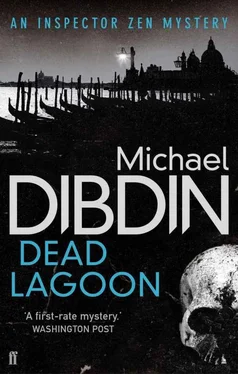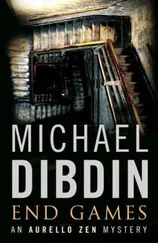Michael Dibdin - Dead Lagoon
Здесь есть возможность читать онлайн «Michael Dibdin - Dead Lagoon» весь текст электронной книги совершенно бесплатно (целиком полную версию без сокращений). В некоторых случаях можно слушать аудио, скачать через торрент в формате fb2 и присутствует краткое содержание. Жанр: Полицейский детектив, на английском языке. Описание произведения, (предисловие) а так же отзывы посетителей доступны на портале библиотеки ЛибКат.
- Название:Dead Lagoon
- Автор:
- Жанр:
- Год:неизвестен
- ISBN:нет данных
- Рейтинг книги:5 / 5. Голосов: 1
-
Избранное:Добавить в избранное
- Отзывы:
-
Ваша оценка:
- 100
- 1
- 2
- 3
- 4
- 5
Dead Lagoon: краткое содержание, описание и аннотация
Предлагаем к чтению аннотацию, описание, краткое содержание или предисловие (зависит от того, что написал сам автор книги «Dead Lagoon»). Если вы не нашли необходимую информацию о книге — напишите в комментариях, мы постараемся отыскать её.
Dead Lagoon — читать онлайн бесплатно полную книгу (весь текст) целиком
Ниже представлен текст книги, разбитый по страницам. Система сохранения места последней прочитанной страницы, позволяет с удобством читать онлайн бесплатно книгу «Dead Lagoon», без необходимости каждый раз заново искать на чём Вы остановились. Поставьте закладку, и сможете в любой момент перейти на страницу, на которой закончили чтение.
Интервал:
Закладка:
Dolfin looked back at Zen. He held out a limp hand towards the woman.
‘And this, dottore, is Rosetta Zulian.’
Zen’s initial reaction was one of disbelief, closely followed by anger. What did Dolfin take him for? The man’s wickedness was matched only by his effrontery. The tale which Ada Zulian had told him earlier that evening had been rambling, oblique and full of lacunae, a rebus spelling out a truth too terrible to be put into words, but Zen had been left in very little doubt as to what must have happened in the nightmare period following the German invasion half a century earlier.
Alone of all her family, Rosa Coin had survived the operation to ‘cleanse’ Venice of its Jewish population. That much was certain from the police report which Zen had read. Her parents and siblings had been packed off to the death camps, but Rosa’s name was struck off the list of deportees since she had been ‘found hanged’. Yet just two years later a person calling herself Rosa Coin turned up alive and well in Israel, claiming that but for Andrea Dolfin she would have shared the fate of the rest of her family and hundreds of her friends and neighbours.
When Ada had suggested, if only to ridicule the idea, that the Germans might have been mistaken about the identity of the dead girl, Zen had realized that the apparent contradictions in her tale resolved themselves if one simply substituted the name Rosetta for Rosa. Ada Zulian still could not admit to herself that her daughter was dead, so she had told her story inside out. It was Rosetta who had been kidnapped and killed by Dolfin, who had lured her to his house with sweets and treats.
Thanks to his contacts, he would already have known that Rosa’s family was to be included in the next group of deportees. Perhaps he had even arranged to have them included himself, so as to facilitate his evil scheme. That was the key to the whole plan. Once he was assured of it, he could do what he liked with the hapless Rosetta. Then, when she was dead, Dolfin had gone to the Coin family with a proposal which he knew they were bound to accept, hideous as it was. They and their other children were doomed, but their daughter Rosa might live, her entry struck off the deportation list as already dead when the corpse of her lookalike friend was ‘found hanging’.
What parent could refuse? Despite their horror, their outrage and anguish, the Coins could not refuse this gruesome exchange. No doubt Dolfin made it easy for them, pretending that Rosetta had died of illness or by accident. In any case, he was running absolutely no risk of being exposed. In the Nazi-occupied Italy of 1943, Jews were non-persons, bureaucratic data deprived of rights or civil status, mere apparitions awaiting their turn to be processed out of existence altogether. It was unthinkable for them to lay charges against anyone, never mind a powerful and influential ally of the puppet regime. The Coins had no choice but to accept, and thus Rosetta Zulian vanished from the face of the earth, leaving no trace of evidence against the man who had callously plotted and carried out her murder. Ada Zulian might suspect the truth, but neither she nor anyone else could ever prove anything. It was the perfect crime.
For Dolfin to have got away with that was loathsome enough. For him to be touted as a paragon of selfless heroism by the unwitting Rosa Coin was even worse. But to desecrate his victim’s memory by parading this alcoholic doxy as Rosetta Zulian was a gesture of arrogance and contempt almost beyond belief. Zen felt a suffusion of fury suffocating him. On some level he knew that it had less to do with Andrea Dolfin, whatever his sins, than with Francesco Bruno and Carlo Berengo Gorin, with Tommaso Saoner and Giulio Bon, and above all with Cristiana Dal Maschio and her husband. But that insight was impotent against his overwhelming urge to lash out, to smash his fist into Dolfin’s face and shatter that mask of serene detachment once and for all.
It was something in the woman’s face that restrained him, a quality of rapt attention whose meaning was enigmatic but which was utterly compelling in its intensity. As he returned her insistent gaze, Zen realized why she had appeared familiar when he walked into the bar: the woman bore a quite astonishing resemblance to Ada Zulian. You had to be looking the right way to see it, looking beyond the seedy details, the quirks of dress and accidents of age, to the underlying genetic structure. Then, like a trick drawing, it suddenly clicked into place, bold and unmistakable.
As so often in this waterborne city, Zen had the sensation that the whole room was in motion, the floor undulating gently like the deck of a boat. But the instability was all internal. In a twinkling, all the ideas he had so confidently been rehearsing seemed as insubstantial as a dream on awakening. No amount of elaborate theorizing counted for anything beside Zen’s abrupt conviction that the woman sitting opposite him was indeed Rosetta Zulian.
Noting the consternation on Zen’s face, Andrea Dolfin smiled artfully.
‘She was always a great favourite of mine. Weren’t you, dear?’
The woman continued to gaze expressionlessly at Zen.
‘Her mother pretended to think there was something unnatural about it,’ Dolfin continued. ‘Wishful thinking! The plain truth was less palatable. Rosetta simply preferred my company to that of her mother.’
He made a disparaging moue.
‘Not that that was any great accomplishment on my part. La contessa was obsessed to an absurd degree with considerations of her family’s lineage and gentility. The rest of us just laughed at her pretensions, but poor Rosetta had to live with them, day in, day out. Ada set rigorously high standards of behaviour and taste, but her conception of the aristocratic ideal didn’t allow much room for maternal love. On top of that, she wouldn’t permit her daughter to associate with the local girls of her age, whom she of course considered common. Since the Zulians scarcely mingled in the social circles that Ada might have regarded as acceptable, poor Rosetta was starved of both affection and company.’
He exchanged a glance with his companion.
‘Her response was to come and visit me whenever she could, and to make a secret friend in the Ghetto, a world to which her mother had no access.’
The woman smiled elliptically. There was something bizarre about her continuing silence, and the way that Dolfin was discussing her as though she weren’t present.
‘It shouldn’t be necessary to say it, but after what Ada has no doubt hinted I had better make it quite clear that there was never any question of carnal relations between us. Quite apart from anything else, my own proclivities in that regard — they have ceased to trouble me for many years — happened to be for my own sex. My lover was killed in 1941 fighting the British at Benghazi. He was the reason I joined the party in the first place. All that died with him, all the big ideas, the high hopes. I had to start again, like someone after an accident. I had to think about all the things I’d taken for granted. And that’s where Rosa helped me.’
He looked at the woman and smiled.
‘She says I saved her life, but she’d already saved mine.’
Zen looked at him sharply.
‘I thought it was Rosa Coin whose life you saved.’
The woman looked at the old man and gestured impatiently. Then she spoke for the first time.
‘That’s enough bullshit, Andrea.’
The voice was pure Venetian, as turbid and swirling as water churned up by a passing boat. She turned back to face Zen.
‘I am Rosa Coin.’
Zen searched her eyes for a long time without finding any weakness. He shook his head feebly.
‘But she… she lives in Israel.’
‘I used to. Some cousins of mine who lived in Trieste went out there after the war, and once they were settled they invited me to join them. I didn’t know what else to do. Andrea had been hiding me in his house, but I couldn’t go on living there once the war was over. I wanted to make a fresh start, to begin again, a new life in a new nation.’
Читать дальшеИнтервал:
Закладка:
Похожие книги на «Dead Lagoon»
Представляем Вашему вниманию похожие книги на «Dead Lagoon» списком для выбора. Мы отобрали схожую по названию и смыслу литературу в надежде предоставить читателям больше вариантов отыскать новые, интересные, ещё непрочитанные произведения.
Обсуждение, отзывы о книге «Dead Lagoon» и просто собственные мнения читателей. Оставьте ваши комментарии, напишите, что Вы думаете о произведении, его смысле или главных героях. Укажите что конкретно понравилось, а что нет, и почему Вы так считаете.











